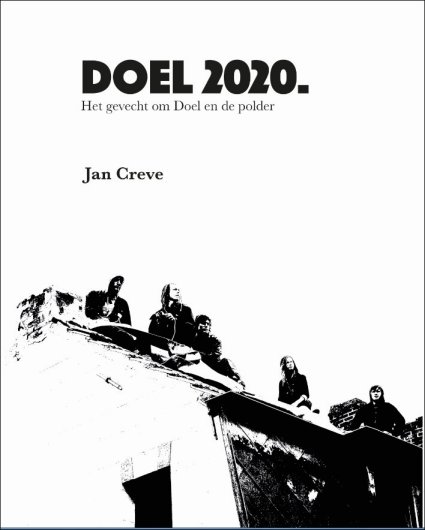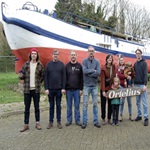 |
 BOEK: Doel2020. Het gevecht om Doel en de polder (door Jan Creve) BOEK: Doel2020. Het gevecht om Doel en de polder (door Jan Creve)€ 24,- overschrijving op rek. nr. BE 26 4186 0588 9129 van Doel2020, vermelding van je adres en "Bestelling boek Doel 2020" |
Press release Doel 2020, Februari 15, 2018Flemish Minister announces port expansion of Antwerp but experts doubt its feasibilityBelgium: Saefthinghedock Port of Antwerp will probably never be buildLast week Flemish minister Ben Weyts (Mobility and Public Construction) informed that he is an advocate for a 'Saefthinghedock Light' nearby and in Doel, the village beside the Port of Antwerp in Belgium. This should serve to take in the expected container capacity. But specialists are having doubt whether this dock is feasible or even necessary at all. Moreover the plan seems to be especially serving one shipping company: MSC. For many years already, the Flemish Government has been trying to get plans approved for the Saefthingedock. Therefore however the historical village of Doel must vanish and also the exceptional heritage landscape around Doel is threatened and would have to dissapear. The past 20 years all plans to destroy the village have failed. They have failed because of the resistance of the residents. But also because at every turn the Saefthingdock collided with objections of Europe and the Council of State, Belgium's highest court.
|
 |
Doel vierde 25 jaar gemeenschapshuis De Doolen 1 oktober 2025 |
 |
Extra-Containercapaciteit aan herziening toe door plannen Katoen Natie 30 september 2025 |
 |
Scheldewijding en Doelse feesten 17 augustus 2025 |
 |
Nieuwsbrief van 5 augustus 2025 5 augustus 2025 |
 |
D2020 waarschuwt voor losse eindjes bij project mobiliteit Waaslandhaven 5 augustus 2025 |
 |
Doel 2020 wil maatregelen tegen vandalisme in Doel 30 juli 2025 |
 |
D2020 en EGPD vragen aandacht voor habitats op erfgoedsites 26 april 2025 |
 |
Gemeentebestuur moet inzage geven in mailverkeer technofestival 8 april 2025 |
 |
Overlijden medestander Paul Staes 13 november 2024 |
 |
Opnieuw hommeles rond technofestival in Doel 31 augustus 2024 |
 |
48ste Doelse Feesten en Scheldewijding 18 augustus 2024 |
 |
Nieuwsbrief van 13 augustus 2024 13 augustus 2024 |
 |
Overlijden Guido Van de Walle 28 juni 2024 |
 |
Nieuwsbrief van 28 juni 2024 28 juni 2024 |
 |
Restauratiewerken Ortelius in Doel deze week van start 14 maart 2024 |
 |
Historisch kerkhof Doel krijgt opwaardering 1 februari 2024 |
 |
Onroerenderfgoedrichtplan Doel en polders 9 oktober 2023 |
 |
Doelse Feesten en Scheldewijding 2023 27 augustus 2023 |
 |
47e Scheldewijding en Doelse Feesten: Doel mee maken 23 augustus 2023 |
 |
Nieuwsbrief van 6 augustus 2023 6 augustus 2023 |
 |
ANB herziet plannen ivm kap van bosgebied in Verrebroek 14 juli 2023 |
 |
Kap van bosgebied in Verrebroek is onaanvaardbaar 7 juli 2023 |
 |
Maurice Vergauwen overleden 20 mei 2023 |
 |
D2020 tevreden met tijdelijke oplossing molen Doel 10 mei 2023 |
 |
Verbond voor de Toekomst. 1 jaar verder. 30 maart 2023 |
 |
Dreigende instorting maalderij Doel toont waar noden liggen 8 maart 2023 |
 |
Nieuwsbrief van 8 maart 2023 8 maart 2023 |
 |
Provincie wijst plannen Molen af. Doel 2020 wil realistische oplossing 1 maart 2023 |
 |
Nieuwe website KoesterDoel.be 26 februari 2023 |
 |
Technofestival Doel had g��n rechtsgeldige vergunning 26 oktober 2022 |
 |
Bordjes begraafplaats Doel zorgen voor paniek nabestaanden 24 oktober 2022 |
 |
Zogenaamd Doelfestival geen meerwaarde voor een uniek dorp als Doel 19 september 2022 |
 |
Rechtbank wijst vordering van Doelenaars af 1 september 2022 |
 |
Scheldewijding en Doelse Feesten 21 augustus 2022 |
 |
46e Scheldewijding in Doel op zondag 21 augustus in geest van optimisme 10 augustus 2022 |
 |
Beveren zet zichzelf klem met afgekeurd plan molen Doel 16 juli 2022 |
 |
Nieuwsbrief van 4 juli 2022 4 juli 2022 |
 |
Plannen voor technofestival in Doel komen voor de rechtbank 20 juni 2022 |
 |
Kan technofestival in Doel nog doorgaan? 12 juni 2022 |
 |
Bewoners en verenigingen willen geen dancefestival in historisch centrum van Doel 31 maart 2022 |
 |
Doel 2020 en het Verbond voor de Toekomst 30 maart 2022 |
 |
Nieuwsbrief van 30 december 2021 30 december 2021 |
 |
Toekomst Doel krijgt vorm met aanplant voedselbos 18 december 2021 |
 |
Doel op shortlist van The 7 Most Endangered Programme 2022 15 december 2021 |
 |
Historisch schip Ortelius ommekeer voor Doel 20 november 2021 |
 |
Grootste Nederlandse erfgoedvereniging draagt Doel voor als meest bedreigd erfgoed Europa 15 november 2021 |
 |
Bezwaren bij restauratieproject Hof ter Walle 23 september 2021 |
 |
Doel 2020 opgetogen met beslissing bufferdijk 8 september 2021 |
 |
Nooddecreet voor nieuw dok op Linkeroever? 10 juni 2021 |
 |
EGD&P in beroep in tegen sloop. Gemeente erkent argumenten 28 mei 2021 |
 |
Werkgroep Doel opgeschort. Vlaamse Regering start nieuwe onderhandelingen op. 28 mei 2021 |
 |
Gemeente wil behoud Ouden Doel en vergeet andere gehuchten 16 mei 2021 |
 |
Nieuwsbrief van 30 april 2021 30 april 2021 |
 |
ECA-problemen blijven: wantrouwen en te weinig garanties leefbaarheid 28 april 2021 |
 |
D2020 tevreden met maatregelen overlast en blijft aandringen op gemaakte afspraken Vlaamse Regering 27 april 2021 |
 |
Doel 2020 blijft afwachtend na doorstart toekomststudie Doel 21 maart 2021 |
 |
Historisch schip Ortelius komt naar Doel. 3 maart 2021 |
 |
Toekomststudie Doel heropgestart, controverse blijft. 9 februari 2021 |
 |
Vlaamse Regering moet einde maken aan obstructie Havenbestuur 27 januari 2021 |
 |
Doel 2020 opgetogen met beslissing renovatie kaaimuur haven Doel 5 december 2020 |
 |
Complex Project ECA gaat deels in op bezwaren actiecomit�s 2 december 2020 |
 |
Fakkeltocht afgelast 7 november 2020 |
 |
Kaaimuur Doel wordt nu toch hersteld 13 oktober 2020 |
 |
Doel, een (blijvende) schande voor Vlaanderen 17 september 2020 |
 |
Havenuitbreiding Linkerscheldeoever zit op dood spoor 27 juli 2020 |
 |
Nieuwsbrief van 7 juli 2020 7 juli 2020 |
 |
Strafmaatregelen van Vlaamse Regering voor Doel en de polderdorpen 14 juni 2020 |
 |
Rechtsgang Raad van State tegen ECA was/is onvermijdelijk 27 mei 2020 |
 |
Mobiliteitsplannen zonder betrekking polderdorpen slag in het water 8 mei 2020 |
 |
Historisch schoolschip Ortelius gaat naar Doel 22 april 2020 |
 |
Historisch kerkhof van Doel wordt behouden! 8 april 2020 |
 |
Reportage Gehavend van Martijn Veerman 27 februari 2020 |
 |
500 bomen weg in ruil voor buffering polderdorpen? 22 februari 2020 |
 |
Nieuwsbrief van 7 januari 2020 7 januari 2020 |
 |
Regering bevestigt havenuitbreiding maar problemen niet van de baan 20 december 2019 |
 |
Fakkeltocht Doel bracht 800 mensen op de been 11 november 2019 |
 |
6e Fakkeltocht voor Doel en Polder 10 november 2019 |
 |
Geen veer, wel pleziervaarten op gevaarlijke Schelde 14 oktober 2019 |
 |
Voor de 15de maal brand gesticht in Doel 30 september 2019 |
 |
Vertoning documentaire Doel 29 september 2019 |
 |
Breng de waterbus naar Doel 21 september 2019 |
 |
De lusten voor de Haven, de lasten voor de gemeenschap. 16 september 2019 |
 |
Tentoonstelling dorpstekenaar Jeroen Janssen, Belvue-museum, Brussel 13 september 2019 |
 |
VLM wil beslagname bij woordvoerder Doel 2020 26 augustus 2019 |
 |
Programma 45e Doelse Feesten en Scheldewijding 11 augustus 2019 |
 |
45e Scheldewijding en Doelse Feesten op zondag 11 augustus in het dorp dat niet weg wil. 6 augustus 2019 |
 |
Nieuwsbrief van 5 augustus 2019 5 augustus 2019 |
 |
Opnieuw veerdienst Doel-Lillo tijdens Scheldewijding Doel 18 juli 2019 |
 |
Erelijst Eerste DoolenPo�zieLawinePrijs 13 juli 2019 |
 |
Voorlo(H)opige, F(H)inale, (H)Artistieke (H)Afsluitsessie 6 juli 2019 |
 |
Ruime opkomst voor boek over geschiedenis van Doel 2020 17 juni 2019 |
 |
Nieuwsbrief van 12 juni 2019 12 juni 2019 |
 |
Dichter-wandeling & Fototentoonstelling 1 juni 2019 |
 |
Doel blijft en dat is definitief 17 mei 2019 |
 |
Gemeente wil geen overleg met Doel 2020 en Doelland 9 mei 2019 |
 |
DoelDorpsDichter nodigt uit: Maarten Ingels 4 mei 2019 |
 |
Fiets op erfgoeddag langs evenementen en poldermonumenten 27 april 2019 |
 |
DoelDorpsDichter nodigt uit: Nelly Maes 6 april 2019 |
 |
Project Groot-Saeftinghe moet rekening houden met nieuwe realiteit en bewoners 15 maart 2019 |
 |
Schepen en MLSO-voorzitter Boudewijn Vlegels tegen plan Weyts? 22 januari 2019 |

